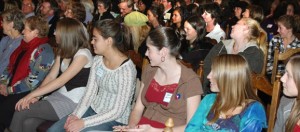Younger Women Desert Female Candidates
September 1, 2011
 By Paul Bedard for U.S. News & World Report – The political sisterhood, led by activists from Gloria Steinem to Hillary Clinton, is dead. New polling finds that younger women (aged 18 to 34) are cool with the status of women in politics and don’t see any need to help their gender at the ballot box.
By Paul Bedard for U.S. News & World Report – The political sisterhood, led by activists from Gloria Steinem to Hillary Clinton, is dead. New polling finds that younger women (aged 18 to 34) are cool with the status of women in politics and don’t see any need to help their gender at the ballot box.
“The primary reason for it is that younger women do not perceive…it to be that unusual to have women running,” says a disappointed Celinda Lake, a Democratic pollster who teamed with Republican pollster Bob Carpenter to conduct research on the 2010 gubernatorial campaigns for the Barbara Lee Foundation.
Worse, she says, younger women expressed support for female candidates but deserted them on Election Day.
In the 1960s through the ’80s, women flooded the polls to help female candidates during the women’s liberation period. Now, younger women see that the era worked, and women are installed at virtually every level of politics, says Lake.
“Young women are used to seeing women in leadership positions and also very influenced by the emergence of very strong, vivid women candidates in Hillary Clinton and Sarah Palin, and I think one of the major things is that they just don’t perceive there to be that much of a problem, that we have a lot of women running; we have Hillary, you have Sarah, what’s the problem?” she says. [Vote now: Has Michelle Bachmann eclipsed Sarah Palin?]
Carpenter, vice president of American Viewpoint, adds, “having females in office is not the rarity that it was even 20 or 30 years ago.”
The new poll, which looks at races where women ran for governor in 2010, did, however, find that older, baby boomer women were sticking with the sisterhood.
“A decade ago, we reported that younger women were among those voter groups with the strongest preference for a woman candidate, and suggested that higher turnout among young women was a strategy to combat high turnout among voters biased against women,” report Lake and Carpenter in the poll. “In 2010, women under 50 were less likely than those over 50 to vote for the woman candidate. Younger women ages 18 to 34 expressed a slight preference and slight enthusiasm for women candidates, but that preference was not borne out in their actual voting behavior. Baby-boom-generation women over the age of 50 were the most supportive group of voters for women candidates.”
Still, Barbara Lee, founder of the organization that works to help women get elected, notes that women are enjoying a “more level playing field” because voters look at women and men about the same on economic issues, strength, and leadership as they do men
What’s more, women have advantages in areas men can’t compete, such as “likability,” which she said played a big role in the 2010 election for women, coming in second after partisanship as the key voting issue.
Nonetheless, Lake suggested that younger female voters should be reminded that men still greatly outnumber women in office and that the 2010 elections cut deeply into the number of women in public office.
“Not only do we not have that many, but 2010 made that worse,” says Lake.
To read the full article, click here.
